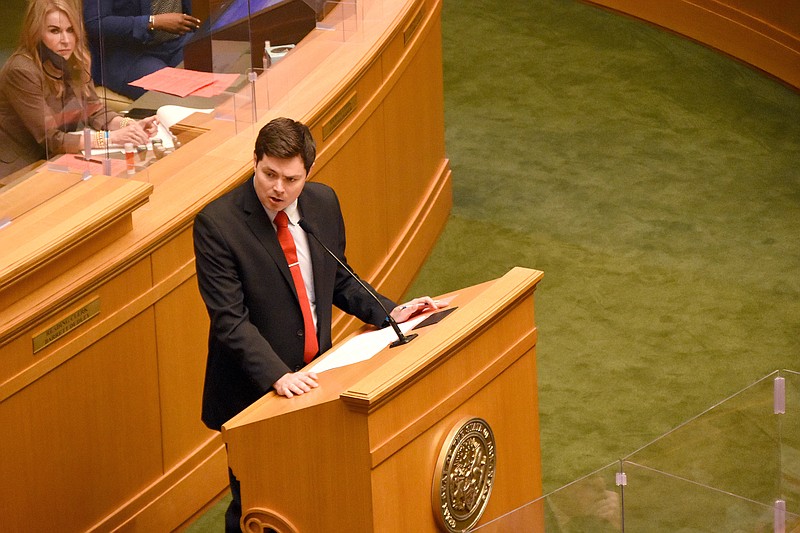The Arkansas House has voted to put the question of raising the threshold for passing ballot measures to 60%, up from the simple majority currently required, to the people in 2022.
House Joint Resolution 1005 by Rep. David Ray, R-Maumelle, passed in a 74-18 vote. If the state Senate approves it, it will become one of three constitutional amendments that the Legislature will refer to voters next year.
Ray said HJR1005 is "a much-needed safeguard for our initiative and constitutional amendment process."
"It is entirely too easy to amend our state constitution. We shouldn't amend our constitution in just some sort of willy-nilly fashion," Ray told lawmakers.
The proposal is officially titled the "Constitutional Amendment and Ballot Initiative Reform Act."
The 60% requirement would apply to both citizen-led ballot initiatives as well as proposed amendments that originate in the Legislature.
"I think it's important that voters know there will be an equal standard," Ray said.
Arkansas is one of several states this year where Republican-controlled legislatures have advanced measures to increase the percentage of voters that must approve constitutional amendments for them to become law, according to elections-reference website Ballotpedia.
The House's vote Thursday was largely along party lines, with Rep. Richard Womack, R-Arkadelphia, the only member of the GOP who dissented. Rep. Fred Allen, D-Little Rock, voted present, and seven did not vote: House Speaker Matthew Shepherd, R-El Dorado; Rep. Deborah Ferguson, D-West Memphis; Rep. Ken Ferguson, D-Pine Bluff; Rep. Monte Hodges, D-Blytheville; Rep. Stephen Meeks, R-Greenbrier; Rep. Josh Miller, R-Heber Springs; and Rep. Mark Perry, D-Jacksonville.
No other lawmaker spoke for or against HJR1005 before the vote. House Minority Leader Tippi McCullough, D-Little Rock, said Democrats opposed the measure because they feel an initiated act from the public shouldn't have a higher standard to pass than bills in the Legislature do, but it was clear the minority party didn't have the numbers to sink HJR1005.
"The writing was on the wall," McCullough said.
Ray said Arkansas has some of the most lenient rules for ballot initiatives in the country, which leave the state susceptible to "big money" and out-of-state interests. HJR1005 is modeled after a provision that Florida adopted in 2006, he said. He also described the measure as a "guardrail" to prevent Arkansas voters from having to consider more than a dozen proposals every election cycle, as California voters do.
David Couch, a Little Rock attorney who drafted successful constitutional amendments that raised the state's minimum wage and legalized medical marijuana, said Thursday there would be opposition to the proposal, possibly in the form of a countermeasure.
"People in Arkansas are protective of their direct democracy," Couch said, calling the proposal the Legislature's latest effort to make it more difficult for citizen-led initiatives to get on the ballot.
He noted grassroots groups' opposition to Issue 3 in 2020, a proposed constitutional amendment from lawmakers that would have overhauled the state's process for amending the constitution and made it harder for the Legislature and petitioning groups to get measures on the ballot. The proposal failed by more than 10 percentage points.
Ray said previously that he supported Issue 3, but thought it combined too many changes, making it easy for it to get "confused and distorted."
Couch also raised the possibility of suing for fraud because the measure's title doesn't say specifically what it would do. He said there's no "dark money" in citizen-led ballot initiatives because of the required financial disclosures. "Dark money" refers to election spending that has unknown sources.
Amendment 98, which legalized medical marijuana in Arkansas, fell below the 60% threshold, gaining voters' approval by about six percentage points in 2016.
Amendment 100, which allowed casino gambling, was approved in 2018 with 54% of the vote.
Also in 2018, the plan to raise Arkansas' minimum wage to $11 an hour by 2021, won more than 68% of the vote.
A spokeswoman for Republican Gov. Asa Hutchinson said Thursday he is still reviewing HJR1005. The governor doesn't have any role in approving proposed constitutional amendments, unlike with bills.
HJR1005 was one of 42 proposals lawmakers considered this session. Members of the House Committee on State Agencies and Governmental Affairs, the panel in charge of recommending which of the proposed constitutional changes go to the House floor for consideration, submitted lists ranking their top choices. Ray's proposal won the most points.
The committee's other top choices were House Joint Resolution 1001 by Rep. Frances Cavenaugh, R-Walnut Ridge, which would have authorized the Legislature to convene itself in special session, and House Joint Resolution 1004 by Rep. Stephen Meeks, R-Greenbrier, which would have allowed the Legislature to reduce or eliminate personal property taxes and would have eliminated personal property taxes by Jan. 1, 2047.
Information for this article was contributed by John Moritz of the Arkansas Democrat-Gazette.
